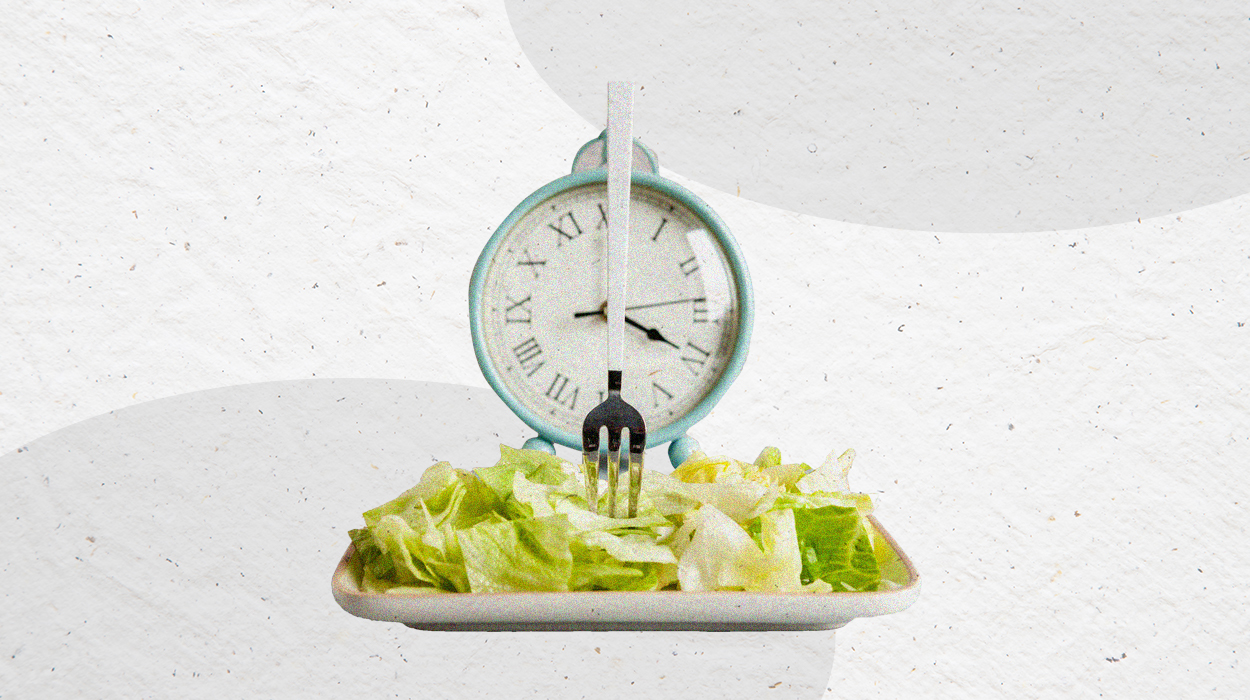 Expert's opinion
Expert's opinion
Expert's opinion
The article is a subjective view on this topic written by writers specializing in medical writing.
It may reflect on a personal journey surrounding struggles with an illness or medical condition, involve product comparisons, diet considerations, or other health-related opinions.
Although the view is entirely that of the writer, it is based on academic experiences and scientific research they have conducted; it is fact-checked by a team of degreed medical experts, and validated by sources attached to the article.
The numbers in parenthesis (1,2,3) will take you to clickable links to related scientific papers.
How Long Does Intermittent Fasting Take To Work 2024?

Picture this, you are new to intermittent fasting. Each day you climb the scale, looking for a difference in your body weight, yet the figures remain relatively the same.
Now, you are probably worrying. You might be wondering if you are doing it right. Knowing how soon to expect results with intermittent fasting might help you become more patient with this diet.
So, how long does it take?
How Long Does Intermittent Fasting Take To Show Results?
You might begin to first notice a difference in your body about 10 days after you begin intermittent fasting. It could take between 2-10 weeks for you to lose significant weight. You might lose up to a pound each week.
How Long Does Intermittent Fasting Take To Work?
Usually, the first sign you will notice that your intermittent fasting is working is less bloating. Your midsection might look trimmer just over your first week of intermittent fasting.
Observing weight loss will take a little longer as your body needs some time to adjust to this new diet.
At about the second week is when most people first notice that they have dropped their first few pounds. If you have still not lost any weight by week two, stay consistent for about four or five more weeks and your results should come in soon enough.
How Much Weight Can You Lose From Intermittent Fasting?
Intermittent fasting is not a quick weight loss fix. It might take your body a few weeks to start shedding the extra pounds.
Do not expect to drop up to 20 pounds within your first week of intermittent fasting routine.
Like many diets, you need to remain consistent and make lifestyle changes to get results.
It might take a few weeks for you to drop your first pound from intermittent fasting. However, once you start, you can expect to lose about a pound each week. Some people can lose up to 10 pounds each month.
Therefore, your body type will determine your results.
Why You Are Not Shedding Weight With Intermittent Fasting?
So, you have been fasting intermittently for up to eight weeks without losing weight or you have gained more pounds.
Let us take a look at a few reasons delaying your intermittent fasting results.
You Are Eating The Wrong Type Of Food
Many other diets come with a list of foods that you can and cannot eat. However, that is not how intermittent fasting works.
Intermittent fasting lets you eat anything you would like within a specific eating window.
Because intermittent fasting does not restrict your diet, it is easy to slip right into unhealthy feeding habits. Binging on unhealthy processed foods even if it is only in your eating window could be responsible for your slow results.
Stuffing too many calories during your eating periods is also counterproductive.
During your intermittent fast, consider changing your meal plan. Toss out the unhealthy processed food and switch to healthier options. Think of foods like whole grains that are rich in dietary fiber.
Furthermore, sugary foods could send your blood sugar levels through the roof and contribute to reduced insulin sensitivity[1].
Staying away from sugary foods protects you from sugar highs and the sugar crash that results after. It also helps keep your blood sugar within the normal range.
You Are Not Drinking Enough Water
If you are reading, drink some water right now. Intermittent fasting restricts your meal times but places no restrictions on water drinking throughout the day.
Drink enough water to stay hydrated during your fast. You can also take tea or black coffee to replenish your lost fluids without breaking your fast.
Drinking water can keep you full till your next eating period. Therefore it keeps you from snacking and packing on extra calories.
Staying hydrated is important for your overall health. If you are exercising, you ought to drink even more water to replace what you lost through sweat.
You might also need to change your lifestyle to include better sleep if you are thinking of starting intermittent fasting.
You Are Not Eating Enough Food
Though it might sound counterproductive, you need to eat well during your eating window.
Intermittent fasting does not mean starvation and you can continue with your normal diet.
When you are not getting enough calories during your eating window, chances are that you will eat a whole lot more during your next window. That is because of the uncontrollable hunger that you will feel.
Also, starving yourself might cause your body to store more fat long-term[2]. Your body notices that you are going for extended periods with little or no food and to ensure that you have a reliable energy source during such periods, your body stores the extra food you eat as fat.
So, instead of burning energy from your meals, your body begins to conserve energy.
Calorie counting could help you ensure you are getting sufficient fuel for your day’s activities.
Your Fasting Window Is Too Short
If you want to notice a difference in your body weight, your eating window during your intermittent fasting diet should be significantly less than normal.
If the difference between your eating window before and during intermittent fasting is only an hour or two, you might barely notice significant weight loss.
A 14-hour fasting window with a 10-hour eating window seems like a great place to start. However, if you find the 14 hours to be too long, you could start with a shorter fasting duration and work your way up.
You Keep Breaking Your Fast
If you are used to snacking in between meals, staying without food for an extended fasting period could be difficult and affect your intermittent fasting results.
Consistently breaking your fast before your fasting window is up could be responsible for your lack of progress with intermittent fasting.
Your fasting period might be too long and switching your eating schedule a bit might be helpful. Consider reducing your fasting period to about 10-12 hours and begin to increase it as time goes on.
Moving up slowly allows your body to get used to going extended periods without food, therefore, you are less likely to break your fast prematurely.
When you can tolerate going longer without food, you could move up to the intermittent fasting plan: known as the 16:8 approach. Here, you will have eight hours for feeding.
You Are Not Eating Enough Protein
If you find that your meals cannot carry you across your fasting period to your next eating window, then you might need to adjust your diet.
Consider including more lean protein in your diet. It does not matter the type of protein, vegan or animal protein, all are fine.
Proteins can help keep you full[3] till your next meal. Furthermore, if you are exercising during this period, proteins are important for building your muscles and protecting your bone health.
Your meals should have healthy fats, carbs, leafy greens, and proteins.
How To Maximize Your Weight Loss During Intermittent Fasting
Intermittent fasting is a great way to lose weight and it is pretty effective at its job without any help.
However, there are a few things you can do to improve your weight loss results from your intermittent fasting diet.
Exercise

You can engage in physical activity while fasting however, the scientific community seems to be divided on the significance of exercising in the fasting state. Some studies[4] suggest that people lose more weight when they exercise while fasting while others disagree[5].
Exercising while fasting might be worth a shot but you should remember to go about it safely.
Your doctor will guide you on acceptable workout routines, especially if you have an underlying medical condition like low blood pressure or diabetes. Your healthcare provider will provide medical advice that will keep you safe from injury on your health journey.
Meal Prep
Only healthy food is allowed during fasting. You might want to ensure that you always have healthy foods at hand so that you do not fall into the trap of junk food or binge eating.
Meal prep will help you watch your calorie intake and maintain a healthy lifestyle even after you stop the diet.
Supplements

Sometimes, a little help might be all you need to jump-start your weight loss journey.
Supplements provide an easy way to lose weight. However, be sure to discuss your options with your doctor before starting any supplement for fat loss.
Conclusion
Intermittent fasting albeit an effective weight loss diet is not a quick fix. It can take up to eight weeks for you to notice significant weight loss when intermittent fasting.
If you are lucky you could begin noticing changes in your body from as early as 10 days but if not, give your body up to two months to adjust.
Making intermittent fasting work for you requires your dedication. You will need to put in the time.
If you are not eating enough, the right type of food, missing proteins, getting dehydrated, or simply breaking your fast prematurely, that could delay your intermittent fasting results.
Exercising, prepping your meals, and using supplements could help you burn fat and maximize your intermittent fasting results. You can also enjoy its other health benefits such as the anti-aging effects if you are consistent.
+ 5 sources
Health Canal avoids using tertiary references. We have strict sourcing guidelines and rely on peer-reviewed studies, academic researches from medical associations and institutions. To ensure the accuracy of articles in Health Canal, you can read more about the editorial process here
- The Nutrition Source. (2013). Carbohydrates and Blood Sugar. [online] Available at: https://www.hsph.harvard.edu/nutritionsource/carbohydrates/carbohydrates-and-blood-sugar/.
- NHS Choices (2022). Healthy weight. [online] Available at: https://www.nhs.uk/live-well/healthy-weight/.
- Godman, H. (2013). Extra protein is a decent dietary choice, but don’t overdo it – Harvard Health. [online] Harvard Health. Available at: https://www.health.harvard.edu/blog/extra-protein-is-a-decent-dietary-choice-but-dont-overdo-it-201305016145.
- Vieira, A.F., Costa, R.R., Macedo, R.C.O., Coconcelli, L. and Kruel, L.F.M. (2016). Effects of aerobic exercise performed in fasted v. fed state on fat and carbohydrate metabolism in adults: a systematic review and meta-analysis. British Journal of Nutrition, [online] 116(7), pp.1153–1164. doi:10.1017/s0007114516003160.
- Schoenfeld, B.J., Aragon, A.A., Wilborn, C.D., Krieger, J.W. and Sonmez, G.T. (2014). Body composition changes associated with fasted versus non-fasted aerobic exercise. Journal of the International Society of Sports Nutrition, [online] 11(1). doi:10.1186/s12970-014-0054-7.



